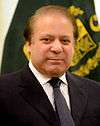Ashtar Ausaf Ali
| Ashtar Ausaf Ali اشتر اوصاف علی | |
|---|---|
| Minister of State | |
|
Assumed office 25 February, 2015 | |
| President | Mamnoon Hussain |
| Prime Minister | Nawaz Sharif |
| 29th and 35th Advocate General of Punjab | |
|
In office 2 January, 2012 – 5 April, 2013 | |
| Governor | Latif Khosa |
| Preceded by | Khawaja Haris |
| Succeeded by | Shahid Karim |
|
In office 20 November, 1998 – 12 October, 1999 | |
| Governor | Shahid Hamid |
| Preceded by | Khawaja Muhammad Sharif |
| Succeeded by | Maqbool Elahi Malik |
| Prosecutor General of Punjab | |
|
In office 15 September, 2011 – 2 January, 2012 | |
| Advisor to the Prime Minister on Human Rights | |
|
In office 21 December, 1997 – 12 October, 1999 | |
| Appointed by | Nawaz Sharif |
| Personal details | |
| Born |
19 June, 1956 Lahore, Pakistan |
| Alma mater |
Forman Christian College Punjab University George Washington University |
| Occupation | Lawyer |
| Religion | Islam |
Ashtar Ausaf Ali (Urdu: اشتر اوصاف علی; born 19 June, 1956) is a Pakistani lawyer and the current Minister of State, as Special Assistant to the Prime Minister on Law since 25 February, 2015. He previously served as Advocate General of Punjab twice, from 1998 to 1999 and 2012 to 2013. He also served as Prosecutor General of the province from 2011 to 2012, and as Advisor on Human Rights to Prime Minister Nawaz Sharif in 1997.[1]
Ausaf came to prominence for successfully representing the Sharif government before the Supreme Court in 1993, overturning the dissolution of parliament by President Ghulam Ishaq Khan. As Minister of State, Ausaf has been a proponent of the 21st Amendment to the Constitution, and lifting the moratorium on the death penalty.
Education and early life
Ashtar Ausaf Ali was born in Lahore, Pakistan, the eldest son of Judge Iftikhar Ali Sheikh. He completed his Bachelor of Arts from Forman Christian College in 1975, and his LLB from Punjab University in 1980, where he also taught as adjunct lecturer for international law from 1984 to 1988. He became a member of the Lahore Bar Association in 1980, and was awarded an MCL from George Washington University, where he was a member of the Phi Delta Phi legal fraternity.
Legal career
Ashtar Ausaf Ali came to prominence in the 1990s as a litigator and constitutional lawyer. After President Ghulam Ishaq Khan dismissed the government of Prime Minister Nawaz Sharif in 1993, he successfully represented Sharif before the Supreme Court of Pakistan against the dissolution of parliament. The Supreme Court overturned Ghulam Ishaq's dismissal, and Sharif was re-elected in 1997. Ausaf was then appointed Advisor to the Prime Minister on human rights. He was appointed Advocate General of Punjab in May 1998, but resigned from his post when General Pervez Musharraf overthrew the Sharif government in a military coup.
Detention during emergency rule
Ashtar Ausaf supported the Lawyers' Movement for the restoration of an independent judiciary. After Musharraf declared a state of emergency in 2007, Ausaf was detained by the military regime from the Lahore office of the Human Rights Commission of Pakistan on 5 November, 2007. He suffered a heart attack in custody.[2]
Advocate General Punjab
Following general elections in 2008, General Musharraf resigned as President. The Pakistan Muslim League (Nawaz) formed the provincial government in Punjab, and Ashtar Ausaf was appointed Prosecutor General of the province in 2011, before again being appointed Advocate General on 2 January, 2012. He stepped down when the caretaker government took over for the 2013 elections, and resumed private practice at Ashtar Ali & Co.[3]
Escape from gun attack
On 29 June, 2013, Ashtar Ausaf's convoy came across two armed dacoits robbing a woman in Garden Town, Lahore. Ausaf ordered his guards to intervene, upon which the dacoits opened fire on Ausaf's car. Ausaf was unharmed. After fleeing the scene, the dacoits were arrested from Band Road.[4]
Minister of State
Following Pakistan Muslim League (Nawaz)'s victory in the general elections in 2013, Ausaf was appointed to Prime Minister Sharif's cabinet as Special Assistant to the Prime Minister on Law, with the charge of Minister of State, on 25 February, 2015.
Support for 21st Amendment
The 21st Amendment to the Constitution of Pakistan, enshrining military courts trying terrorists for two years, was challenged by Hamid Khan in the Supreme Court, while Ausaf advised the government on its defence. Following the Supreme Court's validating military courts on 4 August, 2015, Ausaf called the decision "another strike against terror".[5] Ausaf also said that civilian institutions would be strengthened in tandem with the military courts' time-bound operation over the next two years, along with prosecution and evidence collection. He distinguished previous military courts as tools for military regimes to suppress democracy, whereas the 21st Amendment envisaged them as a constitutional means to convict terrorists.
See also
References
- ↑ "LHC restrains Punjab government from removing law officers". dailytimes.com. Retrieved 29 September 2013.
- ↑ HRCP: Police attack at HRCP Head Office, 55 human rights activists arrested
- ↑ "Ashtar Ausaf Ali". ashtarali.com. Retrieved 29 September 2013.
- ↑ Former AG Punjab Ashtar Ausaf escapes attack
- ↑ "Judges uphold military justice". Pakistan Today. 5 August 2015. Retrieved 16 August 2015.

